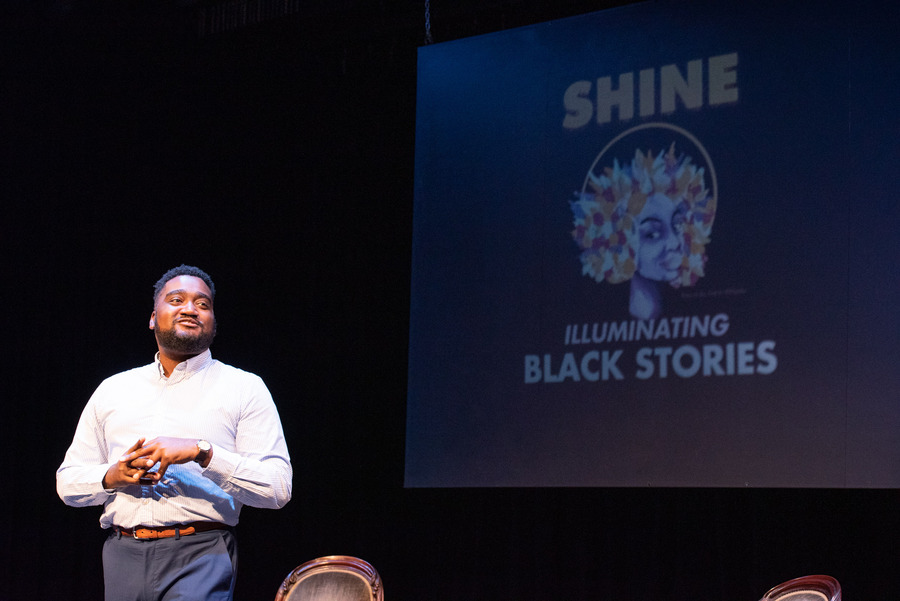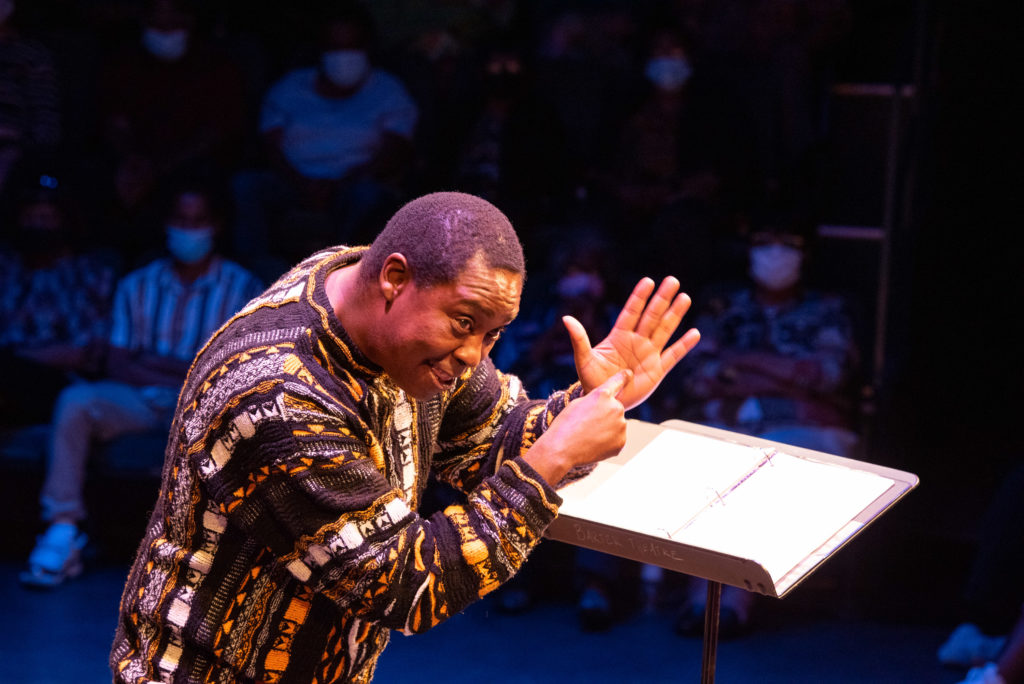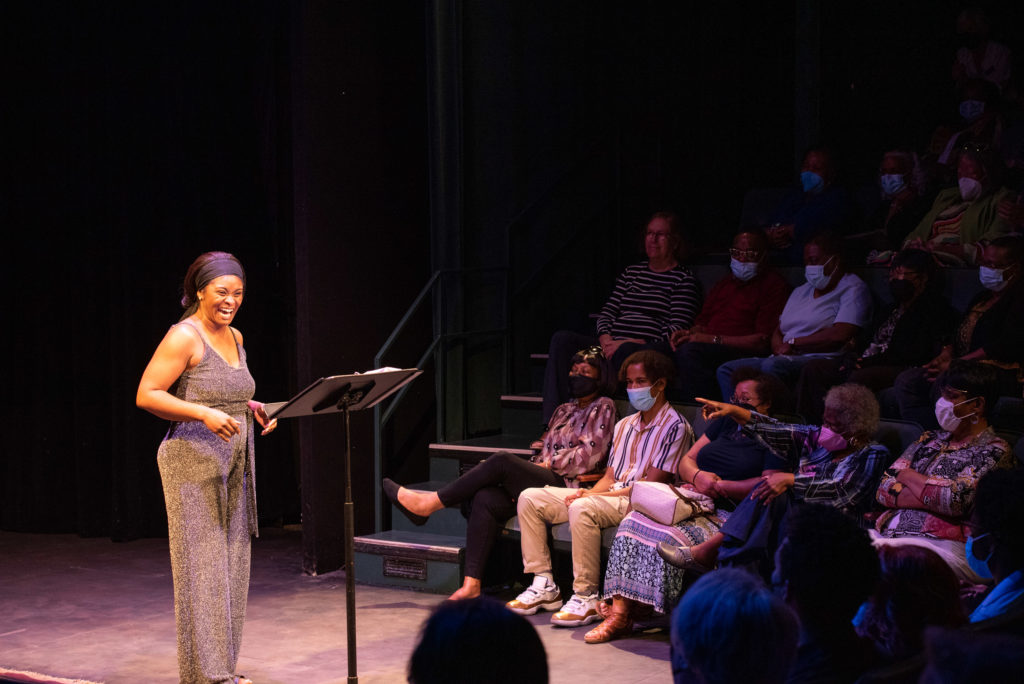Barter Theatre in Virginia isn’t unique in their current position: It is a predominantly white institution that is currently attempting to better serve audiences and artists of color. But the innovative structure of Barter’s new Black Stories Black Voices program—which will have its second public showing with a “Shine: Illuminate Black Stories” event on theatre’s mainstage on Feb. 26—could well serve as a national model for inclusive art-making that embraces and empowers Black communities at mainstream theatres.
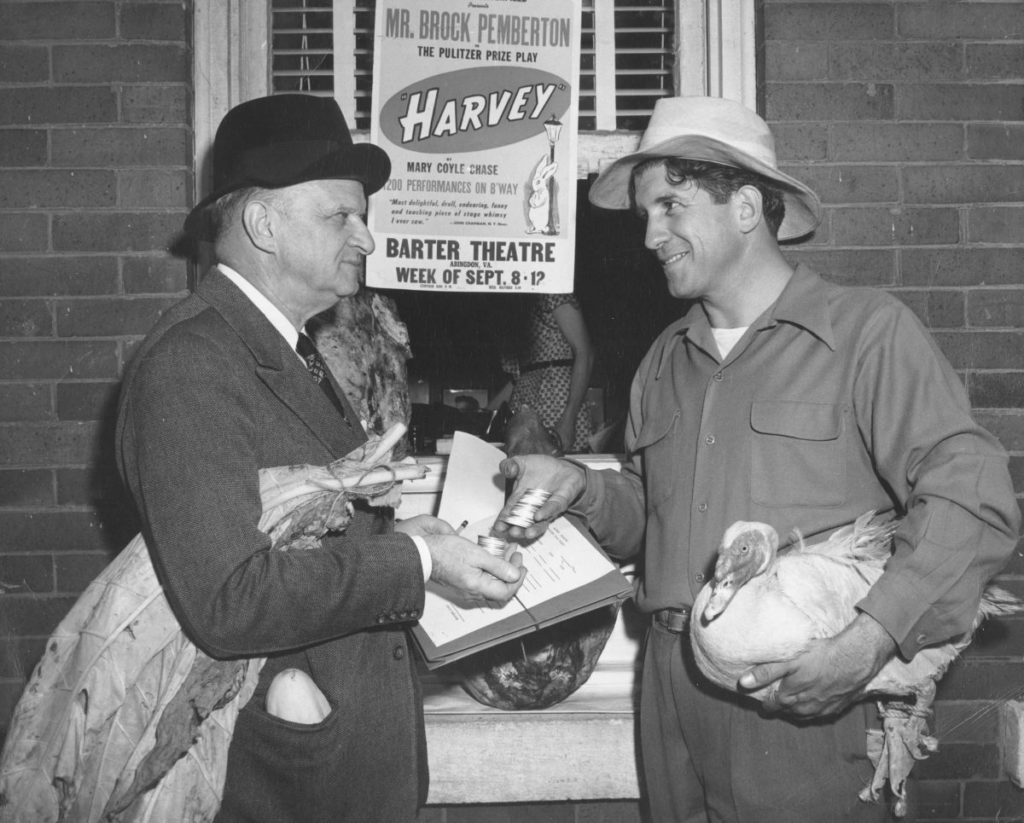
It may seem like a departure, but in some ways it’s also a continuation. When, 90 years ago, Robert Porterfield founded Barter in his rural, mostly white hometown of Abingdon, Va., in the midst of the Great Depression, he brought New York actors to this Appalachian agricultural area to match unemployed—and in some cases, underfed—actors with local farmers struggling to sell goods to people with little money. The price of admission was 40 cents, or an equivalent amount of produce, dairy, or livestock. “Porterfield and his partners accepted almost anything as payment,” according to Encyclopedia Virginia. “A pig was worth 10 tickets, while two quarts of milk bought one ticket.” Barter thrived during those early years of the regional theatre movement, bringing big-city plays to small-town audiences.
Full disclosure: I spent six years working as a director and resident actor at Barter in the early 2000s. My immersion in this organization gave me an appreciation for certain aspects of the institutional culture of this rural LORT theatre. While those of us in the artistic company constantly pushed ourselves to improve, the leadership operating with the working assumption that great art and artists don’t come exclusively from urban centers.
During my tenure, Barter had an acting company made partly of out-of-towners—big-city pros who landed at Barter and stayed—alongside some home-grown artists. A few particularly talented local performers made their artistic home at Barter, and the Barter Players, the young, non-Equity company, produced many actors who eventually joined the resident acting company.
While few would deny that the creation of regional theatres in the United States was a positive development, in their early days these organizations often operated with a kind of cultural imperialism, as they attempted to enlighten or elevate audiences by bringing work from the cities to “the provinces.” In an attempt to better serve its Appalachian population, 20 years ago Barter started the Appalachian Festival of Plays and Playwrights. This encouraged writers to tell the stories of the unique region where Barter is located, and while some of these new plays featured characters who were Black, Indigenous, or people of color, they mostly told stories of the majority-white population of the Southern Appalachian Mountains.
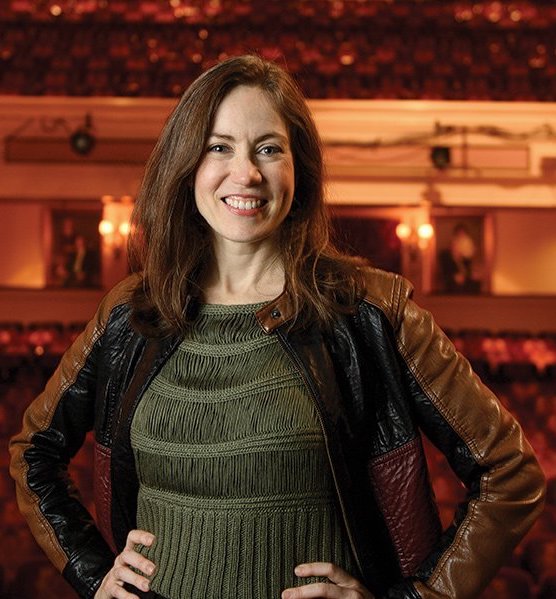
Just before the pandemic, Katy Brown became Barter’s new producing artistic director, only the fourth in the theatre’s 90-year history. Brown herself is a home-grown leader; I remember seeing her first performance 25 years ago with the Barter Players shortly after she finished college. Like many other predominantly white theatres, Barter has begun hiring more people of color, and producing more shows telling stories of Black Americans. They’ve also designated that at least one play in the yearly Appalachian Festival of Plays and Playwrights be written by a Black artist. But in the spirit of Barter’s culture of empowerment, honoring its region, and developing local artists, they’ve also created the program Black Stories Black Voices (BSBV).
BSBV is the brainchild of collaborative thinking from many on the Barter leadership team. The first public performance under this new initiative was the 2022 Shine project last April 24, which featured professional actors reading new monologues submitted by Black residents of the counties surrounding Barter.
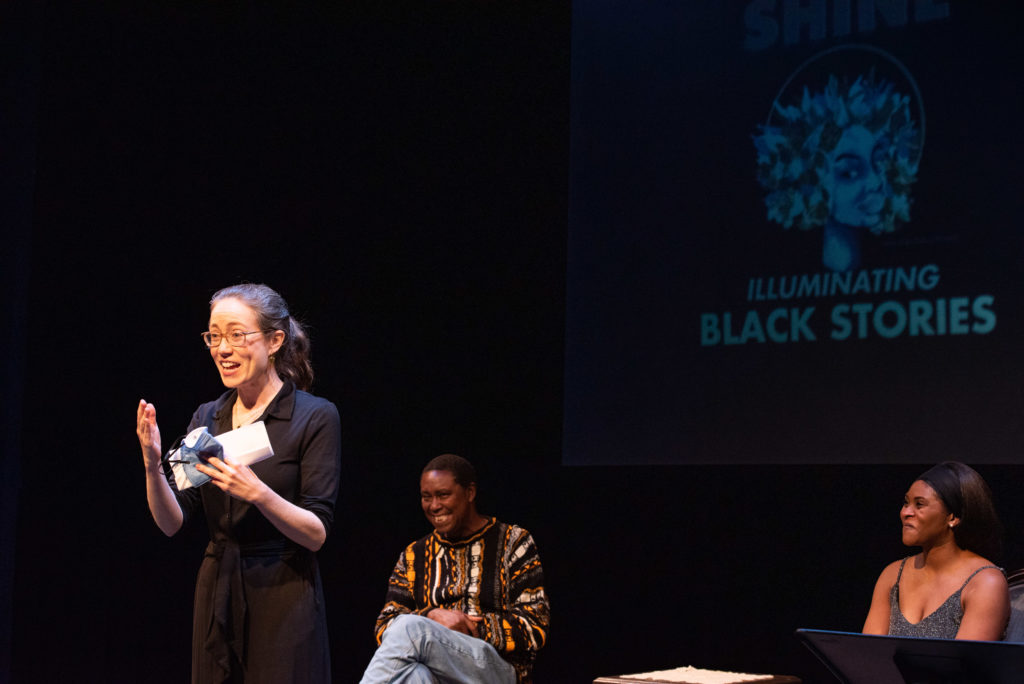
Brown said that creating Shine and BSBV was a way to both honor the theatre’s history and attempt to better serve and include locals of color. She and her staff asked themselves, she recalled, “How do we get more pieces of Appalachia into our stories, understanding that that has to do with multicultural perspectives all the way back to the beginning of things? Barter from its seeds has been about a certain kind of inclusion. Robert Porterfield was at the vanguard of the idea that theatre doesn’t just belong to rich people that live in cities.”
The Barter team wanted input from an authority regarding presenting more inclusive stories. They reached out to Dr. William H. Turner, a known expert on Black life in the South and Appalachia, and Turner suggested that rather than just focusing on producing Black plays, they help create Black playwrights.
“We wanted people who knew nothing about playwriting to get involved, so that’s where the story collection idea came from, and that came through Cathy,” Brown said, referring to Barter’s resident playwright, Catherine Bush. Bush suggested asking local people to share stories and then hiring Black artists to help turn stories into monologues. At Shine, those monologues were performed by professional actors, and the Barter team intends the next steps to be turning monologues into scenes and eventually full-length plays.
But to encourage the sharing of stories, Barter needed to strengthen their outreach and build relationships, especially with communities of color. Enter Terrance Jackson, a Florida native who initially came to Barter as an actor, and who now leads both Barter’s Outreach and Black Stories Black Voices.

“Our statement of intent is to provide a safe space for Black Appalachian artists to share their stories and showcase their work, while also fostering our Black community with a safe space to see theatrical work,” said Jackson. To this end, he has begun the long process of gaining trust, and of demonstrating that Barter is invested in the lives of people in the community. He aspires “to make our theatre matter to people. The goal is that I will be reaching out to different groups and different people, not just Black and brown people, but all types of people, and letting them know that they matter at our theatre, and that they have a place here.”
Jackson helps spread the word about BSBV, inviting people to visit the website and access writing prompts and resources on Black Appalachian history, figures, and events. Prompts for the inaugural Shine project ranged from news of a recent cross burning in response to a Black Lives Matter march, to environmental injustices suffered by Black communities in coal country, to historic figures such as the first Black NASCAR driver.
Prompts are simply a starting point, as writers can contribute personal stories as well. And to help new writers adopt a playwriting mindset, Barter recruited help from Alabama-based theatre artist Quinton Cockrell. Cockrell, whose full-length play City Limits was a winner of Barter’s 2021 Appalachian Festival of Plays and Playwrights, ran a virtual workshop to help new writers understand the basics of creating dramatic work.
The Barter team then chose monologues to include in Shine, which played to a standing-room-only crowd in Barter’s smaller theatre. The inaugural event was so popular that the 2023 Shine performance, scheduled for Feb. 26 at 5 p.m., will move to the larger Gilliam Stage, thus tripling audience capacity.
Tina McDaniel, a retired human resources professional who has lived all her life near Barter, participated in Shine despite thinking of herself as neither a writer nor Appalachian, recognizing that being Black means she doesn’t fit the stereotype of the local population. “I don’t know that I refer to myself as an Appalachian, although I do speak about the region of Appalachia,” McDaniel said. “I think typically when most people think of Appalachia, they think of white Appalachia; they don’t think of Black Appalachia. It’s not something that’s first and foremost in my mind.”
McDaniel, who had occasionally seen shows at Barter, was inspired to submit a monologue after meeting Bush and Jackson. She was impressed and moved by the Shine event, saying, “I didn’t know what it was going to be, but heard from Terrance his vision, and what he would like to see, and it really and truly exceeded my expectations.” Indeed, Shine transformed her relationship with Barter: “For the first time, I felt like Barter was my theatre. I felt like I was a part. For the first time, it felt like this is a part of me. This belongs to me. I had never seen so many African-Americans, Black folks attending an event at Barter, so it was just really amazing.”
Cockrell also recognized that BSBV is making an impressive impact. When visiting Barter for the first time to see the production of his play, Cockrell noted the difference between the crowd at Shine and the audience at another Barter show featuring a white story and with mostly white audience members. He said, “The Shine event was 95 percent African American people, and the stories were, of course, very different, because there is always going to be a certain examination of trauma when you’re dealing with Black stories in the United States. So to go from seeing that show that they normally do to what they did with Shine—I think absolutely they are doing it right. I would encourage everyone to try to experience the work. If you’re in the vicinity of the Barter, check it out, go and see, because I truly think some significant pieces of work are being created for this time in our history.”
Katy Brown hopes that the early successes of BSBV might inspire other theatres pursuing racial equity and inclusion. Abingdon is 94 percent white, yet the Barter staff is elevating Black stories and creating a program that other theatres can emulate. Brown said, “People may feel like if they are in a predominantly white place that there may not be much they can do. I feel like our experience may be helpful to them to know and see that you can.”
Jackson summed up his experience with the project so far by saying, “Barter is a predominantly white institution still, and we are actively doing our best to, not necessarily to change that, but to make it equitable, and to build a space where all people feel comfortable to work and to see plays. We’re not done creating dope Black stuff—we’re just beginning. And hopefully we do work that really matters to Black folks in Appalachia, but also to the entire theatre world and theatre industry as a whole.”
Karen Sabo (she/her) is an actor/director/writer/teacher currently working as artist-in-residence in the Theatre and Dance Department at Missouri State University. She’s been an actor in three different resident companies and fancies herself a theorist. www.karensabo.com


